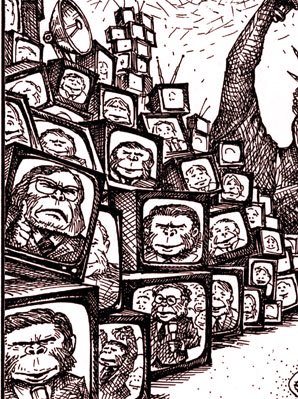
In 2002, John Judis and Ruy Teixeira published a book called "The Emerging Democratic Majority," predicting that large and dependable minorities would grow out of a "strengthening alliance between minorities, working and single women, the college educated, and skilled professionals," as Teixeira wrote on the 10-year anniversary of the book's publication. Over the last 12 years, there has been a lot of back and forth between liberals and conservatives over this thesis, as liberals declared that the Republican Party was the party of the past, and conservatives dryly noted that the emerging majority seemed to be a little hesitant about actually coming out of its shell. At the moment, the opposing camps seem to have settled into two fairly stable sets of opinions: Conservatives point to 2010 and 2014 and say the thesis is bunk; liberals grumpily concede that Republicans may be able to win low-turnout midterm elections, but demographic change is going to lock them out of the presidency for a good long while.
The National Journal has just published a pretty convincing case for the Republican side, authored by … John Judis. Current left-wing theories about the difference between the midterm and presidential electorates, he says, "obscure the possibility that 2014 was not an isolated event but rather the latest manifestation of a resurgent Republican coalition." Democrats are losing middle-class voters, he argues, who dislike hardcore social conservatism but don't mind the milder variety — and, more important, who really dislike rapidly growing government spending and the taxes that go with it.
I had two thoughts when I read this: If even John Judis has given up on the Emerging Democratic Majority, everyone else should give up, too. It's over. If John Judis was wrong about the EDM, then he may be wrong about this, too.
But that second point is not really fair. Readers of Philip Tetlock should know that even the best experts predict world events with only mildly better success than they'd have by guessing at random. (No, not even Paul Krugman.) The EDM was a perfectly reasonable thesis. But it failed to take into account future developments, which Judis highlights in his new essay. What are those developments? Democrats are no longer gaining among the young and the middle class. Instead, they're losing. And while demographic change in the electorate is enough to compensate for the loss of white working-class voters (who have been falling away from the Democratic Party since the late 1960s), it cannot overcome the effect of losing both them and the middle class.
I've long been skeptical of grand EDM theories — perhaps because I remember too well the predictions, fashionable circa 2004, that Democrats were heading for permanent minority status. As Sean Trende explains in his excellent book "The Lost Majority," there's really no such thing as a stable and long-lived coalition. Parties win elections by building large coalitions of voters with disparate interests. Then events, and the internal tensions of their own coalitions, pull them apart. The idea of semi-permanent majorities is an optical illusion, not a law of nature.
I'd add a personal corollary to this, which is that the more ascendant your ideology seems, the more danger it is in of internal fracture, because the center of your coalition is militantly ideological, but the vast masses of voters on the outer edge are not. The more secure the grip on power seems, the more prone the militants are to demand policies that will chase regular voters into the arms of the other side. The 1968 Democratic meltdown is perhaps the clearest example of this, but far from the only one — I'd put 2008 in the same basket. If Democrats had not been so convinced that they were having an FDR moment, they wouldn't have suffered such brutal losses in state and national legislatures over the last four years.
That's why I'm not arguing that Judis has identified an ascendant Republican majority; I don't believe in such things. (To be fair, Judis isn't arguing this, either, though of course his headline writer couldn't resist titling the piece "The Emerging Republican Advantage.") On the other hand, I do think he has identified trends that should worry the hell out of Democrats planning for 2016. The party has allowed itself to settle on Hillary Clinton as the candidate of least resistance: a woman who will be nearly 70 years old in 2016, and who was hand-walked into office in Deep Blue New York State, which is not exactly playing against the varsity. She's never won a tough campaign against a credible opponent. If Judis is right that Democrats are in for a real fight, that may come to look like a fatal mistake.
There is good reason to think that Democrats will be in for a real fight. Some of it comes from Judis, who is certainly right that they have slipped among middle-class voters recently, though we don't know if this is a statistical blip or a trend. He also notes that they are losing their edge with young voters, who were supposed to be the cornerstone of that emerging majority; support among young voters slipped from a high of 65 percent to just 54 percent in the last election. Some of that is the difference between midterms and presidential elections, I'm sure — but this also represents a drop of 6 percentage points from 2006.
Other reasons to think that Democrats might have difficulty include the fact that the longer your party holds the White House, the harder it gets to hold onto it, as voters long for a change and the odds of a scandal rise. To be sure, economic growth and low oil prices are improving Barack Obama's approval ratings, which will help whoever follows. On the other hand, if Al Gore could barely grind to a statistical tie after the 1990s boom, then I wouldn't count on these to carry Clinton over the finish line — even if they last, which they might well not.
Again, this is not to say that Hillary Clinton is doomed. Much depends on who the Republican nominee will be. But on this, I side with Joe Scarborough, who noted during the 2012 primaries that "Republicans don't nominate crazy." They may flirt with crazy; they may even sit down for dinner and a drink. But in the end, they choose something respectable and a little boring to bring home to meet the voters. I expect that will also be true this time around, however opponents may rage that their moderately conservative views ought not to be respectable in a decent society. And this time around, unlike 2012, Republicans have a deep bench of credibly non-crazy candidates to choose from.
So assume that the Democratic nominee is Hillary Clinton, because if it's not Hillary Clinton, they are in even deeper trouble; it will mean that a health crisis or (unlikely) a scandal has forced Clinton to bow out, having sucked up all the funds and the media oxygen that Democrats could have used to develop alternate candidates, and that some unprepared understudy has assumed her place. And assume that she will be facing a Republican candidate who has successfully won a series of elections in a swing state, or even a blue state. And assume that Judis is right about his thesis: Democrats are having trouble with the middle class, who, contra Democratic myth-making, will be perfectly happy to elect a pro-life politician as long as he doesn't start maundering about "legitimate rape" — and as long as he promises to keep their taxes from growing so fast.
Starting with these assumptions, I draw a few very tentative conclusions: The Obama administration is going in exactly the wrong direction with its "middle-class agenda," and this will hurt Hillary Clinton in 2016 unless she repudiates it. The middle class does not want to hear about all the awesome new spending they're going to get to help them out (did anyone cringe during the State of the Union speech when Obama identified a couple that needed help because they couldn't afford new cars and vacations?). The middle class wants to hear that they are going to be able to keep what they have. Absent some completely unpredictable event, like Bill Clinton's death, Hillary Clinton is not going to walk to the presidency; at best, she is going to have a hard fight on her hands. Scott Walker starts looking like the candidate best positioned to take Clinton on: a regular guy, not an Ivy League technocrat, and one who has proven experience winning tough elections and curbing government spending.
These are not predictions, because as Tetlock has shown, predictions are bunk. But they're things to keep in mind as we head into 2016.
Though if Chris Christie continues with this vaccine nonsense, I'm putting him in the "crazy" bin.
Megan McArdle
Bloomberg News
(TNS)
Previously:
• 02/02/15: Hillary's late start won't stop punches
Comment by clicking here.
Megan McArdle is a Bloomberg View columnist who writes on economics, business and public policy. She is the author of "The Up Side of Down." McArdle previously wrote for Newsweek-the Daily Beast, the Atlantic and the Economist.



 Contact The Editor
Contact The Editor
 Articles By This Author
Articles By This Author